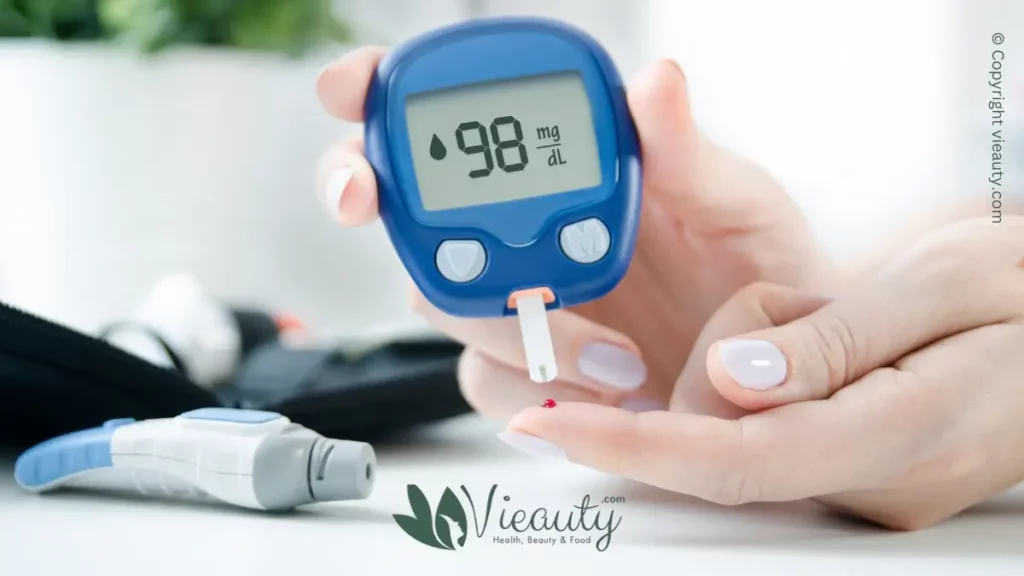Diabetes Management: All You Need to Know to Live a Normal Life
In this comprehensive guide, we will explore the many facets of living with diabetes. We will cover everything from diet and exercise to managing stress and taking care of your mental health. Whether you’re newly diagnosed or have been living with diabetes for years, this guide will provide you with the information and resources you need to take control of your health and live your best life.
Beyond Insulin Injections: A Comprehensive Guide to Diabetes Management

Millions of people around the world suffer from diabetes, which is a persistent medical condition. Living with diabetes can be challenging, but it is possible to manage the condition and live a healthy, happy life. While insulin injections are a common treatment, there is much more to managing diabetes than just taking medication.
1. Understanding diabetes: What it is, types, and causes
Diabetes is a chronic disease that affects how your body processes glucose, which is the main source of energy for your cells. Glucose comes from the foods you eat and is carried by your blood to your cells to provide energy. Insulin, a hormone produced by the pancreas, helps glucose get into your cells to be used for energy. When you have diabetes, your body either doesn’t produce enough insulin or can’t use it effectively, leading to high levels of glucose in your blood.
There are three primary categories of diabetes: type 1, type 2, and gestational diabetes.
Type 1 diabetes occurs when the body’s immune system attacks and destroys the cells in the pancreas that produce insulin, resulting in little to no insulin production. Type 2 diabetes is the most common type and occurs when the body becomes resistant to insulin or doesn’t produce enough insulin. Gestational diabetes occurs during pregnancy and usually goes away after giving birth, but can increase the risk of developing type 2 diabetes later in life.
There are several risk factors that can increase your chances of developing diabetes, including family history, age, obesity, and a sedentary lifestyle. It’s important to understand the types and causes of diabetes in order to manage and prevent its complications.
2. What Are The Symptoms of diabetes? How to spot the early warning signs?
Numerous individuals across the globe suffer from the persistent illness of diabetes, which, when disregarded, has the potential to cause severe medical complications such as cardiac ailments, renal harm, and loss of sight. Therefore, it is essential to spot the early warning signs of diabetes and seek medical attention as soon as possible.
The symptoms of diabetes can vary from person to person, but some of the most common signs include increased thirst and hunger, frequent urination, blurred vision, unexplained weight loss, and fatigue. These symptoms can develop slowly over time, making them difficult to spot at first. It’s important to note that some people with type 2 diabetes may not experience any symptoms at all, which is why regular check-ups with a healthcare professional are crucial.
If you notice any of these symptoms or have a family history of diabetes, it’s important to speak with your doctor about getting a blood test to check your blood sugar levels. Early diagnosis and treatment are key to managing diabetes and preventing complications down the line.
3. The importance of diagnosis and treatment
Diabetes is a condition that affects millions of people around the world. If left untreated, it can lead to serious health complications such as heart disease, kidney failure, and blindness. That’s why it’s essential to get diagnosed as soon as possible if you think you may have diabetes. A proper diagnosis means that you can start receiving treatment right away and take control of your health.
When it comes to treatment, there are many options beyond just insulin injections. While insulin injections are a common and effective method for managing diabetes, there are other treatments available, such as oral medications, lifestyle changes, and even surgery.
The type of treatment that’s right for you will depend on a variety of factors, including your age, overall health, and the severity of your condition. Your doctor will work with you to develop a treatment plan that’s tailored to your specific needs.
It’s important to remember that living with diabetes is a lifelong journey, and there will be ups and downs along the way. However, with the right diagnosis and treatment, you can lead a healthy and fulfilling life despite your condition. By staying informed and working closely with your healthcare team, you can take control of your diabetes and live life to the fullest.
4. Types of diabetes treatment beyond insulin injections
While insulin injections are the most common type of treatment for diabetes, there are other options available that can be just as effective. One such option is oral medication, which can help to lower blood sugar levels and improve insulin sensitivity. These medications are often used in combination with insulin injections to manage diabetes.

Another type of treatment is called an insulin pump, which is a device that delivers insulin continuously throughout the day. This can help to keep blood sugar levels more stable and may be more convenient for some people than multiple daily injections.
For those with type 2 diabetes, lifestyle changes such as diet and exercise can also be effective in managing the condition. Losing weight, eating a balanced diet, and staying active can all help to improve insulin sensitivity and lower blood sugar levels.
There are also alternative therapies available that some people find helpful, such as acupuncture and herbal remedies. While these treatments may not be scientifically proven, they can be a useful addition to a comprehensive diabetes management plan.
It’s important to work closely with your healthcare team to find the right combination of treatments for your individual needs. With proper management, it is possible to live a full and healthy life with diabetes.
5. Managing your diabetes: Diet and exercise strategies
Managing diabetes is a lifelong journey that requires comprehensive strategies to keep it under control. While taking medications, such as insulin injections, is an essential part of managing diabetes, diet and exercise are equally important. In fact, they are the cornerstone of diabetes management.
When it comes to diet, the goal is to balance your intake of carbohydrates, proteins, and fats. Carbohydrates have the most significant impact on your blood glucose levels, so it’s crucial to monitor your carbohydrate intake. You should aim for a balanced diet that includes plenty of fruits, vegetables, whole grains, and lean proteins while avoiding sugary and processed foods. Your doctor or a registered dietitian can help you create a personalized meal plan that suits your lifestyle and preferences.
Physical activity is crucial for controlling diabetes. It helps your body use insulin better, lowers blood sugar levels, and improves cardiovascular health. Aim for at least 30 minutes of moderate-intensity exercise most days of the week. Walking, cycling, swimming, and strength training are great options.
Remember, managing diabetes is not a one-size-fits-all approach. You need to work closely with your healthcare team to develop a personalized plan that fits your unique needs and lifestyle. By incorporating diet and exercise strategies into your daily routine, you can take control of your diabetes and live a healthy, fulfilling life.
6. The role of glucose monitoring in diabetes management
For people living with diabetes, glucose monitoring is a crucial aspect of managing their condition. The goal is to keep blood sugar levels within a certain range, which can be difficult to achieve without constant monitoring.
There are several types of glucose monitoring tools available, including continuous glucose monitors (CGMs) and blood glucose meters. CGMs use a small sensor inserted under the skin to continuously measure glucose levels, while blood glucose meters require a finger prick to obtain a blood sample for testing.
Regardless of the type of monitoring used, it is important to check glucose levels regularly and keep track of the results. This can help identify patterns and trends in blood sugar levels, which can inform medication dosages and lifestyle modifications.

It is also important to communicate glucose monitoring results with healthcare providers to ensure proper diabetes management. Healthcare providers can help interpret the results and make adjustments as needed to keep blood sugar levels in a healthy range.
Overall, glucose monitoring is an essential tool for people living with diabetes, helping them to manage their condition and maintain good health.
7. How to prevent diabetes complications
Diabetes is a chronic condition that can have serious complications if not managed properly. Fortunately, there are ways to prevent these complications and live a healthy life with diabetes. Here are some tips to prevent diabetes complications:
1. Keep your blood sugar levels under control: High blood sugar levels can lead to complications such as nerve damage, kidney disease, and eye problems. It’s important to monitor your blood sugar levels regularly and take medication as prescribed by your doctor.
2. Maintain a healthy weight: Being overweight or obese can increase the risk of complications such as heart disease and stroke. Eating a healthy diet and getting regular exercise can help you maintain a healthy weight and reduce the risk of complications.
3. Quit smoking: Smoking can increase the risk of complications such as heart disease, stroke, and kidney disease. If you smoke, talk to your doctor about ways to quit.
4. Get regular check-ups: Regular check-ups with your doctor can help you monitor your blood sugar levels, blood pressure, and cholesterol levels. Your doctor can also check for signs of complications and provide treatment if needed.
5. Take care of your feet: High blood sugar levels can damage the nerves in your feet, making it harder to feel injuries or infections. Check your feet regularly for cuts, blisters, or other injuries and seek medical attention if needed.
By following these tips, you can reduce the risk of complications and live a healthy life with diabetes. Remember to talk to your doctor about any concerns you have and follow their advice for managing your diabetes.
8. Coping with the emotional challenges of living with diabetes
Living with diabetes can be a challenging and often overwhelming experience. The daily routine of managing glucose levels, administering insulin injections, and monitoring your diet and physical activity can take a toll on your emotional wellbeing. Coping with the emotional challenges of diabetes is just as important as managing the physical aspects of the condition.
One of the most common emotional challenges that people with diabetes face is stress. The stress of managing the condition can lead to feelings of anxiety, depression, and burnout. It’s important to recognize when stress is becoming too much to handle and seek support from friends, family, or a mental health professional.
Another emotional challenge that people with diabetes face is stigma. Despite the fact that diabetes affects millions of people worldwide, there is still a lot of misinformation and judgement surrounding the condition. People with diabetes may feel ashamed or embarrassed about their condition, which can lead to social isolation and a decreased quality of life. It’s important to remember that diabetes is a medical condition like any other and seeking support from others who understand what you’re going through can be helpful.
Finally, diabetes can also have an impact on your relationships with others. Friends and family members may not fully understand the challenges of managing the condition, which can lead to feelings of frustration and isolation. Communicating openly and honestly with loved ones about your needs and challenges can help strengthen your relationships and provide much-needed support.
In conclusion, coping with the emotional challenges of living with diabetes is just as important as managing the physical aspects of the condition. It’s important to seek support when needed, educate others about the realities of diabetes, and communicate openly with loved ones about your needs and challenges. With the right tools and resources, it’s possible to live a fulfilling life with diabetes.
9. The importance of support groups and community resources
Living with diabetes can be a challenging experience. It requires constant care, attention and management, which can take a toll on both mental and physical health. That’s why it is crucial for individuals living with diabetes to have a strong support system to rely on.
Support groups, both online and in-person, provide a safe space for individuals to share their experiences, knowledge and offer support to one another. It is a great way to connect with people who can relate to your struggles and offer insights that go beyond what medical professionals can provide.
Community resources such as diabetes education programs, nutritional counseling, and exercise classes are also great resources to help individuals manage their diabetes. These resources help to provide education on managing medications, eating healthy and staying active, which are all essential factors in diabetes management.
Moreover, these resources offer an opportunity to connect with healthcare professionals and people who have been there before, which can help individuals living with diabetes feel less isolated and more empowered to take control of their health.
In conclusion, support groups and community resources are invaluable resources for individuals living with diabetes. These resources offer a way to connect with others, receive support, and gain knowledge that can be beneficial in managing diabetes. If you or a loved one is living with diabetes, consider exploring these resources to improve your quality of life.
10. Innovations in diabetes treatment and what the future holds
In recent years, there have been a number of exciting innovations in diabetes treatment, with the promise of more to come in the future. One of the most exciting developments has been the advent of continuous glucose monitoring (CGM) systems, which use a tiny sensor inserted under the skin to track blood sugar levels around the clock. CGM systems can help diabetics to better manage their blood sugar levels and reduce the risk of complications, such as nerve damage, kidney failure, and vision loss.
Another promising development has been the use of closed-loop insulin delivery systems, also known as artificial pancreases. These systems use a CGM to monitor blood sugar levels and automatically adjust insulin delivery accordingly, taking the guesswork out of diabetes management and reducing the risk of hypoglycemia. While these systems are still in the early stages of development, they hold great promise for the future of diabetes treatment.
In addition to these technological advancements, there are also ongoing efforts to develop new medications and therapies to treat diabetes. Researchers are exploring everything from gene therapy to stem cell treatments to find new ways to manage and even cure diabetes.
While living with diabetes can be challenging, these recent innovations offer hope for a brighter future for those living with the condition. With ongoing research and development, the outlook for diabetes treatment continues to improve, providing new opportunities for diabetics to live healthy, fulfilling lives.
We hope that our comprehensive guide to living with diabetes has been helpful for those who are living with this chronic condition. Diabetes can be a challenging disease to manage, but with the right knowledge and tools, it is possible to live a healthy and fulfilling life.
Whether you are newly diagnosed or have been living with diabetes for years, we hope that our guide has provided you with valuable information and insights. Remember, taking care of your health is essential, and with the right support and resources, you can manage diabetes successfully.






